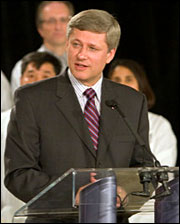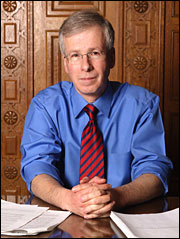Canadian voters regularly told pollsters last year that their top concern was global warming and what to do about it. So when the national election was called for this Oct. 14, the chief opposition party charged out with a bold carbon tax proposal. The other opposition parties also opened their campaigns with carbon tax or cap-and-trade themes.
It looked like an environmentalist’s dream — a national debate over climate change, with voters left to decide on which route to take to reduce greenhouse gases.

Canadian Prime Minister Stephen Harper.
Photo courtesy Office of the Prime Minister
But politics has steered the debate in new directions, making it less likely that the result will be a mandate for major action on climate issues. The ruling Conservative Party has scoffed at significant greenhouse-gas reductions and painted the opposition plans as dangerous tax boosts. The opponents are divided and squabbling. The main Liberal Party challenger, a former environment minister with a dog named Kyoto, has been tarred as bumbling and ineffective.
Voters, rather than rallying to save the environment, tell pollsters they plan to strengthen the hold on power of Conservative Prime Minister Stephen Harper, an outcome analysts agree would mean business-as-usual for Canadian polluters.
“I’m appalled,” said John Bennett, a former Sierra Club officer and now a key strategist for Canada’s small Green Party. “For two and a half years, we were aiming to have this election be about climate change. But every election, that issue fades as we get closer to election time, and it seems to be happening again now.”
Instead, Canadians are worried about the economy, especially in the key electoral battleground of Ontario, where the faltering auto industry helped swell the country’s manufacturing job losses to 88,000 in the last year.
“The economy is the overriding issue. It’s the No. 1 concern here. Voters see what’s happening in the States, and they are worried about layoffs here,” said Bob Hepburn, a columnist for the Toronto Star.
“The Liberals are making the environment their No. 1 issue. But Harper just keeps saying, ‘It’s a tax, it’s a tax.'”

Liberal Party leader Stéphane Dion.
Photo courtesy Liberal Party
The opponents bristle at that tactic. The Liberals, led by Stéphane Dion, have proposed a carbon tax on coal, natural gas, oil, heating fuel, diesel fuel, and gasoline wholesalers starting at $10 a ton and rising to $40 a ton. All the money raised by that levy would be returned to taxpayers through a variety of income and business tax cuts under the party’s “Green Shift” plan, the Liberals say.
“The Conservatives forget the other side, which is a tax shift. It’s dollar for dollar back” to taxpayers, said George Young, a Liberal Party spokesperson. “Of course, the Conservative approach has been not to discuss the concept at all. Their approach has been to try to ‘Swift Boat’ it with a massive ad campaign that has been very negative and personal.”
Harper, who came from Canada’s oil-flush Alberta province to lead the Conservatives to power in February 2006, has been scathing in his criticism. When the “Green Shift” was unveiled last summer, Harper called it “crazy economics” that would “screw everybody across the country.” This month, he warned it would “wreak havoc on the economy” and could pull Canada apart.
The dire drumbeat seems to be working. Dion last week downplayed the importance of the “Green Shift” plan; a gleeful Conservative strategist called it a “full retreat.” Public opinion polls suggest Harper’s Conservatives, who now govern as the largest minority with 41 percent of the House of Commons, will win another controlling minority and could come within striking distance of becoming a majority party for the first time in 15 years.
“For environmentalists, that would not be a good thing,” said Mark Winfield, a political scientist and professor of environmental studies at York University in Toronto. “It would mean an electoral rejection of Dion’s bold proposal, and would scare people off from trying that in the future.”
Winfield is alarmed that he sees the environment becoming a line of demarcation in Canadian politics, just as the Republican Party’s “Drill, baby, drill” chant has become a symbol of division in the American political campaign.
“The idea was that the environment was supposed to be a nonpartisan issue,” Winfield said. “Up until now, I don’t think you had seen a party running on an almost anti-environmental platform,” as the Conservatives are.
The Sierra Club of Canada gave Harper’s environmental platform an F-plus grade, while the Liberals scored a B-plus and the Green Party an A-minus, according to Jean Langlois, the Sierra Club’s national campaign director. The Conservative Party has proposed a program reliant on new technology to lower emissions, a program that Langlois said was “frankly not even trying,” and analysts said would not significantly lower emissions.
“The very first step you have to do is stop the growth” in carbon emissions, replied Goldy Hyder, a senior advisor to the Conservative campaign. “Then you stabilize it and hold it there for awhile. You can’t do dramatic shifts for the economy. Only then will you be able to reverse emissions rates and bring them down.
“Now is not the time, with gas and energy prices what they are, to be talking to consumers and saying, ‘I want to tax you more,'” Hyder said.
Supporters of the carbon tax are discouraged they have been unable to sell the argument that tough action on the environment can actually create jobs and boost the economy, not bankrupt it.
But the self-image of Canadians as fiercely protective of the environment is largely myth, said Nelson Wiseman, author of the book In Search of Canadian Political Culture. “The environment is a leisure issue — something we talk about when we have leisure time,” he said.
Canada signed the Kyoto Protocol, but successive governments have done nothing to implement it, and Canada’s greenhouse-gas emissions have grown. The country is now third in the world — behind the United States and Australia — in tons of carbon dioxide emitted per capita.
Still, the polls have been shifty, and the environmental issue could again seize the electorate in the final stretch of the campaign, Wiseman acknowledged.
“Right now, they are still watching the Food Channel or Comedy Central,” he said. “People will get focused in the last week to 10 days of the election.”

